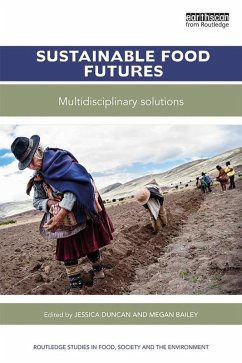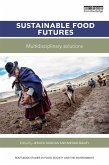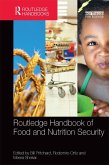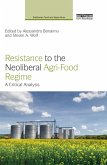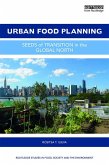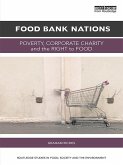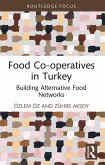Sustainable Food Futures (eBook, ePUB)
Multidisciplinary Solutions
Redaktion: Duncan, Jessica; Bailey, Megan
46,95 €
46,95 €
inkl. MwSt.
Sofort per Download lieferbar

23 °P sammeln
46,95 €
Als Download kaufen

46,95 €
inkl. MwSt.
Sofort per Download lieferbar

23 °P sammeln
Jetzt verschenken
Alle Infos zum eBook verschenken
46,95 €
inkl. MwSt.
Sofort per Download lieferbar
Alle Infos zum eBook verschenken

23 °P sammeln
Sustainable Food Futures (eBook, ePUB)
Multidisciplinary Solutions
Redaktion: Duncan, Jessica; Bailey, Megan
- Format: ePub
- Merkliste
- Auf die Merkliste
- Bewerten Bewerten
- Teilen
- Produkt teilen
- Produkterinnerung
- Produkterinnerung

Bitte loggen Sie sich zunächst in Ihr Kundenkonto ein oder registrieren Sie sich bei
bücher.de, um das eBook-Abo tolino select nutzen zu können.
Hier können Sie sich einloggen
Hier können Sie sich einloggen
Sie sind bereits eingeloggt. Klicken Sie auf 2. tolino select Abo, um fortzufahren.

Bitte loggen Sie sich zunächst in Ihr Kundenkonto ein oder registrieren Sie sich bei bücher.de, um das eBook-Abo tolino select nutzen zu können.
This book seeks to resolve the disconnections in research and governance by breaking down interdisciplinary barriers to develop innovatory food security solutions.
- Geräte: eReader
- mit Kopierschutz
- eBook Hilfe
- Größe: 2.33MB
Andere Kunden interessierten sich auch für
![Sustainable Food Futures (eBook, PDF) Sustainable Food Futures (eBook, PDF)]() Sustainable Food Futures (eBook, PDF)46,95 €
Sustainable Food Futures (eBook, PDF)46,95 €![Routledge Handbook of Food and Nutrition Security (eBook, ePUB) Routledge Handbook of Food and Nutrition Security (eBook, ePUB)]() Routledge Handbook of Food and Nutrition Security (eBook, ePUB)57,95 €
Routledge Handbook of Food and Nutrition Security (eBook, ePUB)57,95 €![Resistance to the Neoliberal Agri-Food Regime (eBook, ePUB) Resistance to the Neoliberal Agri-Food Regime (eBook, ePUB)]() Resistance to the Neoliberal Agri-Food Regime (eBook, ePUB)45,95 €
Resistance to the Neoliberal Agri-Food Regime (eBook, ePUB)45,95 €![Urban Food Planning (eBook, ePUB) Urban Food Planning (eBook, ePUB)]() Rositsa T. IlievaUrban Food Planning (eBook, ePUB)46,95 €
Rositsa T. IlievaUrban Food Planning (eBook, ePUB)46,95 €![Food Sovereignty in International Context (eBook, ePUB) Food Sovereignty in International Context (eBook, ePUB)]() Food Sovereignty in International Context (eBook, ePUB)46,95 €
Food Sovereignty in International Context (eBook, ePUB)46,95 €![Food Bank Nations (eBook, ePUB) Food Bank Nations (eBook, ePUB)]() Graham RichesFood Bank Nations (eBook, ePUB)39,95 €
Graham RichesFood Bank Nations (eBook, ePUB)39,95 €![Food Co-operatives in Turkey (eBook, ePUB) Food Co-operatives in Turkey (eBook, ePUB)]() Özlem ÖzFood Co-operatives in Turkey (eBook, ePUB)21,95 €
Özlem ÖzFood Co-operatives in Turkey (eBook, ePUB)21,95 €-
-
-
This book seeks to resolve the disconnections in research and governance by breaking down interdisciplinary barriers to develop innovatory food security solutions.
Dieser Download kann aus rechtlichen Gründen nur mit Rechnungsadresse in A, B, BG, CY, CZ, D, DK, EW, E, FIN, F, GR, HR, H, IRL, I, LT, L, LR, M, NL, PL, P, R, S, SLO, SK ausgeliefert werden.
Produktdetails
- Produktdetails
- Verlag: Taylor & Francis eBooks
- Seitenzahl: 238
- Erscheinungstermin: 4. August 2017
- Englisch
- ISBN-13: 9781315463117
- Artikelnr.: 49041495
- Verlag: Taylor & Francis eBooks
- Seitenzahl: 238
- Erscheinungstermin: 4. August 2017
- Englisch
- ISBN-13: 9781315463117
- Artikelnr.: 49041495
- Herstellerkennzeichnung Die Herstellerinformationen sind derzeit nicht verfügbar.
Jessica Duncan is an Assistant Professor in the Rural Sociology Group, Wageningen University, the Netherlands. She is the author of Global Food Security Governance: Civil society engagement in the reformed Committee on World Food Security (Routledge, 2015). Megan Bailey is an Assistant Professor in the Marine Affairs Program and Canada Research Chair, Integrated Ocean and Coastal Governance, Dalhousie University, Canada.
1. Sustainable Food Futures: Multidisciplinary solutions Part I:
Recognizing Place 2.Cultural Relevance in Arctic food Security Initiatives
3.Rebuilding Consumers' Trust in Food: Community Supported Agriculture in
China 4.Place-based food systems: "re-valuing local" and fostering
socio-ecological sustainability 5.Recovering Farmland Commons Part II:
Enhancing Participation 6.The Political Economy of Customary Land Rights in
Mozambique: Lessons from a Food Sovereignty Movement 7.Small-scale
aquaculture in the Bolivian Amazon: A contextually-based solution for
positive social and economic outcomes 8.Building 'A World Where Many Worlds
Fit': Indigenous Autonomy, Mutual Aid, and an (Anti-Capitalist) Moral
Economy of the (Rebel) Peasant Part III: Challenging Markets 9.Knowing how
to bring food to the market: appreciating the contribution of intermediary
traders to the future of food availability in Sub-Saharan Africa 10.Certify
sustainable retailers? 11.The solution cannot be conventionalized:
Protecting the alterity of fairer and more sustainable food networks Part
IV: Designing sustainable food futures 12.Cultured meat, better than beans?
13.Soil Currency: Exploring a more equitable, sustainable, and
participatory economic system 14.From pirate islands to communities of
hope: Reflections on the circular economy of food systems Part V:
Conclusions 15.Caution: Road work ahead
Recognizing Place 2.Cultural Relevance in Arctic food Security Initiatives
3.Rebuilding Consumers' Trust in Food: Community Supported Agriculture in
China 4.Place-based food systems: "re-valuing local" and fostering
socio-ecological sustainability 5.Recovering Farmland Commons Part II:
Enhancing Participation 6.The Political Economy of Customary Land Rights in
Mozambique: Lessons from a Food Sovereignty Movement 7.Small-scale
aquaculture in the Bolivian Amazon: A contextually-based solution for
positive social and economic outcomes 8.Building 'A World Where Many Worlds
Fit': Indigenous Autonomy, Mutual Aid, and an (Anti-Capitalist) Moral
Economy of the (Rebel) Peasant Part III: Challenging Markets 9.Knowing how
to bring food to the market: appreciating the contribution of intermediary
traders to the future of food availability in Sub-Saharan Africa 10.Certify
sustainable retailers? 11.The solution cannot be conventionalized:
Protecting the alterity of fairer and more sustainable food networks Part
IV: Designing sustainable food futures 12.Cultured meat, better than beans?
13.Soil Currency: Exploring a more equitable, sustainable, and
participatory economic system 14.From pirate islands to communities of
hope: Reflections on the circular economy of food systems Part V:
Conclusions 15.Caution: Road work ahead
1. Sustainable Food Futures: Multidisciplinary solutions Part I:
Recognizing Place 2.Cultural Relevance in Arctic food Security Initiatives
3.Rebuilding Consumers' Trust in Food: Community Supported Agriculture in
China 4.Place-based food systems: "re-valuing local" and fostering
socio-ecological sustainability 5.Recovering Farmland Commons Part II:
Enhancing Participation 6.The Political Economy of Customary Land Rights in
Mozambique: Lessons from a Food Sovereignty Movement 7.Small-scale
aquaculture in the Bolivian Amazon: A contextually-based solution for
positive social and economic outcomes 8.Building 'A World Where Many Worlds
Fit': Indigenous Autonomy, Mutual Aid, and an (Anti-Capitalist) Moral
Economy of the (Rebel) Peasant Part III: Challenging Markets 9.Knowing how
to bring food to the market: appreciating the contribution of intermediary
traders to the future of food availability in Sub-Saharan Africa 10.Certify
sustainable retailers? 11.The solution cannot be conventionalized:
Protecting the alterity of fairer and more sustainable food networks Part
IV: Designing sustainable food futures 12.Cultured meat, better than beans?
13.Soil Currency: Exploring a more equitable, sustainable, and
participatory economic system 14.From pirate islands to communities of
hope: Reflections on the circular economy of food systems Part V:
Conclusions 15.Caution: Road work ahead
Recognizing Place 2.Cultural Relevance in Arctic food Security Initiatives
3.Rebuilding Consumers' Trust in Food: Community Supported Agriculture in
China 4.Place-based food systems: "re-valuing local" and fostering
socio-ecological sustainability 5.Recovering Farmland Commons Part II:
Enhancing Participation 6.The Political Economy of Customary Land Rights in
Mozambique: Lessons from a Food Sovereignty Movement 7.Small-scale
aquaculture in the Bolivian Amazon: A contextually-based solution for
positive social and economic outcomes 8.Building 'A World Where Many Worlds
Fit': Indigenous Autonomy, Mutual Aid, and an (Anti-Capitalist) Moral
Economy of the (Rebel) Peasant Part III: Challenging Markets 9.Knowing how
to bring food to the market: appreciating the contribution of intermediary
traders to the future of food availability in Sub-Saharan Africa 10.Certify
sustainable retailers? 11.The solution cannot be conventionalized:
Protecting the alterity of fairer and more sustainable food networks Part
IV: Designing sustainable food futures 12.Cultured meat, better than beans?
13.Soil Currency: Exploring a more equitable, sustainable, and
participatory economic system 14.From pirate islands to communities of
hope: Reflections on the circular economy of food systems Part V:
Conclusions 15.Caution: Road work ahead
